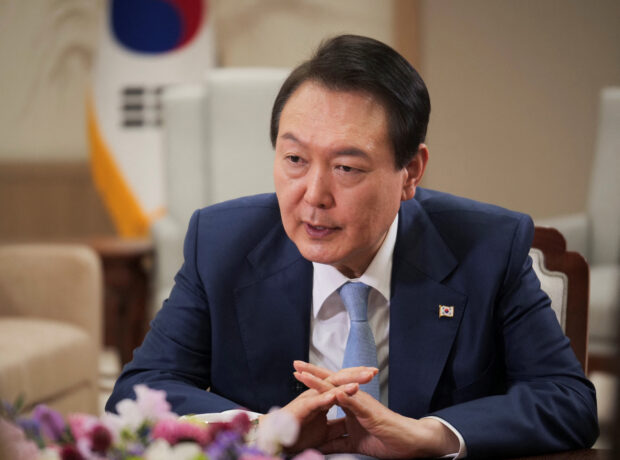
South Korean President Yoon Suk-yeol speaks at an interview with Reuters in Seoul, South Korea, November 28, 2022. REUTERS
SEOUL — South Korean President Yoon Suk Yeol’s trip to Japan on Thursday is aimed at overcoming decades of disputes and mistrust between the two countries.
Some issues, like intelligence sharing and economic cooperation, will be on the agenda. Other long-standing sources of tension are unlikely to be addressed immediately.
– Relations between the two North Asian U.S. allies have been strained over disputes dating to Japan’s 1910-1945 occupation of Korea. Koreans accuse Japan of forcing women to work in wartime brothels for the Japanese military and using forced labor, among other abuses.
– Measures over the years have attempted to resolve the issues. Japan says compensation for forced labour was settled under a 1965 treaty normalizing diplomatic ties and providing South Korea with economic assistance.
– In 2015, South Korea and Japan reached a settlement under which Tokyo issued an official apology to women who say they were enslaved in wartime brothels, and provided 1 billion yen ($9.23 million) to a fund to help the victims. But then-South Korean President Moon Jae-in dissolved the fund in 2018, effectively scrapping the agreement as he said it did not to do enough to consider victims’ concerns.
– In 2018 South Korea’s Supreme Court ordered Japan’s Nippon Steel & Sumitomo Metal Corp (5401.T) and Mitsubishi Heavy Industries (7011.T) to compensate some wartime forced laborers. Tokyo warned of serious repercussions if the orders were enforced.
– Relations deteriorated in 2019 when Japan restricted exports of high-tech material to South Korea. At the time Seoul threatened to pull out of an intelligence-sharing deal with Tokyo, but backed down at the last minute under pressure from the United States, which has pushed for its two allies to mend ties.
– Last week Yoon’s administration proposed establishing a public foundation to compensate the plaintiffs in the Nippon Steel and Mitsubishi Heavy Industries cases. Tokyo and Washington welcomed the announcement, but surviving victims have rejected the plan. South Korea and Japan also announced they would negotiate to lift the export curbs.
– Over the years some South Koreans have boycotted Japanese products and cancelled vacations to the country. Seoul regularly lodges complaints over the way history is recounted in some Japanese textbooks, and there have been flare-ups over the “rising sun” flag seen as a symbol of imperial Japan. Tokyo has accused South Korean leaders of exacerbating tensions to score political points.
– The two countries also have a territorial dispute over a cluster of windswept volcanic islets, known as Dokdo in Korea and Takeshima in Japan. The islets are controlled by Seoul, with a small contingent of coast guard personnel, but are also claimed by Tokyo.
– The United States has pressed both countries to resolve the disputes to better counter rising threats from China and North Korea, among other regional challenges. Under Yoon, South Korea has resumed trilateral military drills and agreed to more intelligence sharing on things like tracking ballistic missile launches from North Korea.
RELATED STORIES